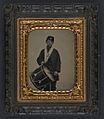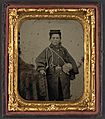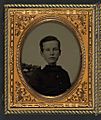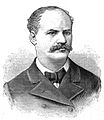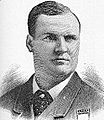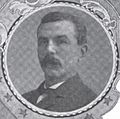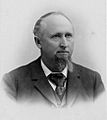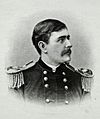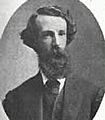Child soldiers in the American Civil War facts for kids
Throughout the American Civil War, many young boys, some as young as 7 years old, joined the fight. It's thought that between 250,000 and 420,000 males under 18 fought for both the Union and the Confederacy. About 100,000 Union soldiers were 15 or younger.
Contents
Young Soldiers in the Civil War
Why Boys Joined the War
When Fort Sumter was attacked, many boys and men joined the army. At first, Abraham Lincoln asked for soldiers to sign up for 90 days. But after tough battles, he asked for 300,000 volunteers to serve for three years.
Boys often joined for the same reasons as adults. In the North, they wanted to protect the Union. In the South, they wanted to defend their homes from what they saw as invaders.
Unlike adults, most boys didn't have strong feelings about slavery. They weren't usually motivated to fight for or against it.
The most common reason boys joined was to escape farm life. In 1860, most Americans lived on farms. Many boys dreamed of returning home as heroes. Almost none expected the war to last so long.
How Boys Enlisted
The official age to join the army was 18. But boys found many ways around this rule.
First, some boys looked older than they were. This trick worked well, especially when recruiting stations were busy and new units were forming quickly.
Second, it was easy to lie about your age. There were no modern IDs like driver's licenses back then. Recruiters also wanted to meet their goals for new soldiers. So, even if they had to say a volunteer was old enough, they often ignored underage recruits. This happened more as both sides needed more soldiers. One clever trick was for a boy to write "18" on his shoes. Then, when asked if he was "over 18," he could truthfully say yes!
Third, some boys joined with an adult's help. For example, sixteen-year-old Ned Hutter joined the Confederate Army in Mississippi. His father told the recruiter that Ned was a hard worker and a good shot. So, Ned was allowed to join.
Many other boys joined legally by taking non-fighting jobs. Lots of young people became musicians, like drummers, buglers, or flutists. The Union Army alone had 40,000 such spots. These boys often helped in other ways too. They carried water, bandages, and stretchers for wounded soldiers. They also delivered messages on the battlefield. Some even picked up rifles and fought.
Life as a Soldier
Food and Clothing
One of the biggest problems for young soldiers was not having enough food. Getting food to the army was very difficult. If anything went wrong with gathering, loading, or moving food, soldiers might not eat for days or weeks.
Hardtack was a common food, but boys didn't like it much. One soldier joked that their hardtack was so old it was baked "before the beginning of the Christian era." This was because the letters "B.C." were stamped on the cracker boxes. Other main foods included pork, coffee, and bread.
Starving boys often found ways to sneak out of camp to find food. They would gather food from the land or take it from local farms. At first, some soldiers felt this was wrong. But as the war continued, they realized that being too kind to enemy property hurt their own side. So, soldiers started taking food more often. Commanders usually pretended not to notice and sometimes shared the food.
Getting uniforms was also hard, especially early in the war. Once colors and styles were decided, uniforms became more standard. But boys often received uniforms that were too big. Also, many boys kept growing and quickly outgrew their clothes.
Some army units didn't have enough uniforms for the boys. So, many had to wear their own clothes from home. Because of this, boys often took uniforms from dead soldiers. Or, they traded food and supplies to have locals tailor their clothes.
Long Marches
The excitement of joining the army soon faded. It was replaced by the boring routines of camp life and long marches.
One soldier described marching day and night under the hot sun. They walked through rivers and over mountains, barely stopping. He said the men sometimes looked unrecognizable because of the thick dust covering their hair, eyebrows, and beards. The dust also filled their mouths, noses, eyes, and ears.
Dangers of Battle
Young soldiers faced the same dangers as adults. This included violent deaths, injuries, and poor medical care. If captured, they lived in terrible conditions.
The romantic ideas young soldiers had about war quickly disappeared. They faced hunger, tiredness, and discomfort. Their letters and diaries describe the awful smell of spoiled meat, the loud sound of cannons, and how easily and randomly soldiers died.
Stories from young Union prisoners in Confederate camps are very sad. Sixteen-year-old Michael Dougherty was shocked by the harsh tools used for punishment. William Smith, a fifteen-year-old soldier, was upset by how sick and thin prisoners looked at Andersonville in Georgia.
Michael Dougherty was the only person from his company to survive Andersonville Prison. He wrote that after five months, their clothes were worn out. Some had only a shirt, others only pants. Their bodies were thin, with bones showing. Their faces were black from smoke, and their hair was stiff. There was no soap or clean water. He said it was impossible to describe how many sick and dying people were everywhere.
Rules and Punishments
Boys committed the same rule-breaking actions as adult soldiers. Their commanders punished them just as harshly.
Common rule-breaking included:
- Being disrespectful to officers or not following army rules.
- Drinking too much alcohol.
- Leaving camp without permission.
- Making noise after "lights out."
- Sitting down while on guard duty.
- Gambling.
Punishments included:
- Hard work.
- Carrying a heavy log alone.
- Standing on a barrel all day.
- Being held in the "guard-tent." This meant being stuck inside and cut off from friends.
- Being put in a box.
- Other physical punishments.
- Wearing a sign describing the offense.
- "Drumming out of camp" was a punishment for being a coward. The soldier's uniform and gear were taken away. He was marched through the camp with guards and music, so everyone could see his shame.
- Death by firing squad was usually for leaving the army without permission (desertion). President Abraham Lincoln often tried to stop these death sentences. Generals sometimes tried to carry out executions quickly so Lincoln couldn't pardon the soldier.
Famous Young Soldiers
Union Soldiers
- Elisha Stockwell, Jr. joined the Union Army at age fifteen. He tricked his father to go. He fought in major battles like Shiloh and Vicksburg. He survived the war and wrote about his experiences.
- Mancil V. "Manny" Root was the youngest Union soldier on record. He joined at age 11 as a drummer boy.
- William Black was the youngest wounded soldier. He was twelve when an exploding shell badly hurt his hand and arm.
- Avery Brown joined at age 8 as a musician.
- John Clem joined at 11 as a drummer boy. At the Battle of Chickamauga, he bravely killed a Confederate officer who told him to surrender. He was promoted to Sergeant and later became a Brigadier General.
- George Penfield Bennett joined at 9 years old. He was a "powder monkey" on a ship, carrying ammunition. He was given a pony for his bravery in battle.
- Arthur MacArthur Jr. joined at 17 and became a colonel at 18. He was wounded three times and later became a lieutenant general. He was the father of General Douglas MacArthur.
-
William Black, drummer boy for the Union
-
Joseph Foraker as a captain in the Union Army
-
Aspinwall Fuller a powder monkey on the USS Hampshire, circa. 1864
Confederate Soldiers
- The Virginia Military Institute Cadet Corps, made of 215 boys aged 14 to 18, bravely fought at the Battle of New Market.
- Washington and Lee University sent a company of 64 boys. Their average age was 17. Many were killed or wounded in battle.
- Charles F Mosby enlisted at age 13.
- James P. Collier was 14 when he was killed in battle.
- Edwin Francis Jemison joined at 16 and was killed in battle a year later.
- Sgt William T. Biedler was 16 years old.
- Walter Mackenzie Clark joined at 14 and quickly rose through the ranks, becoming a Lieutenant Colonel at age 17.
- Jesse James went to war at age 16.
How Many Young Soldiers?
The numbers of young soldiers in the Union Army are quite surprising:
- Over 2,000,000 soldiers were 21 or younger.
- Over 1,000,000 were 18 or younger.
- Over 500,000 were 17 or younger.
- About 200,000 were 16 or younger.
- About 100,000 were 15 or younger.
- About 10,000 were 14 or younger.
- Around 300 were 13 or younger. Most of these were musicians, but some also fought.
- Twenty-five soldiers were 10 or younger.
These numbers are very high compared to older soldiers:
- Only 50,000 soldiers were 25 or older.
- Only 15,000 were up to age 44.





